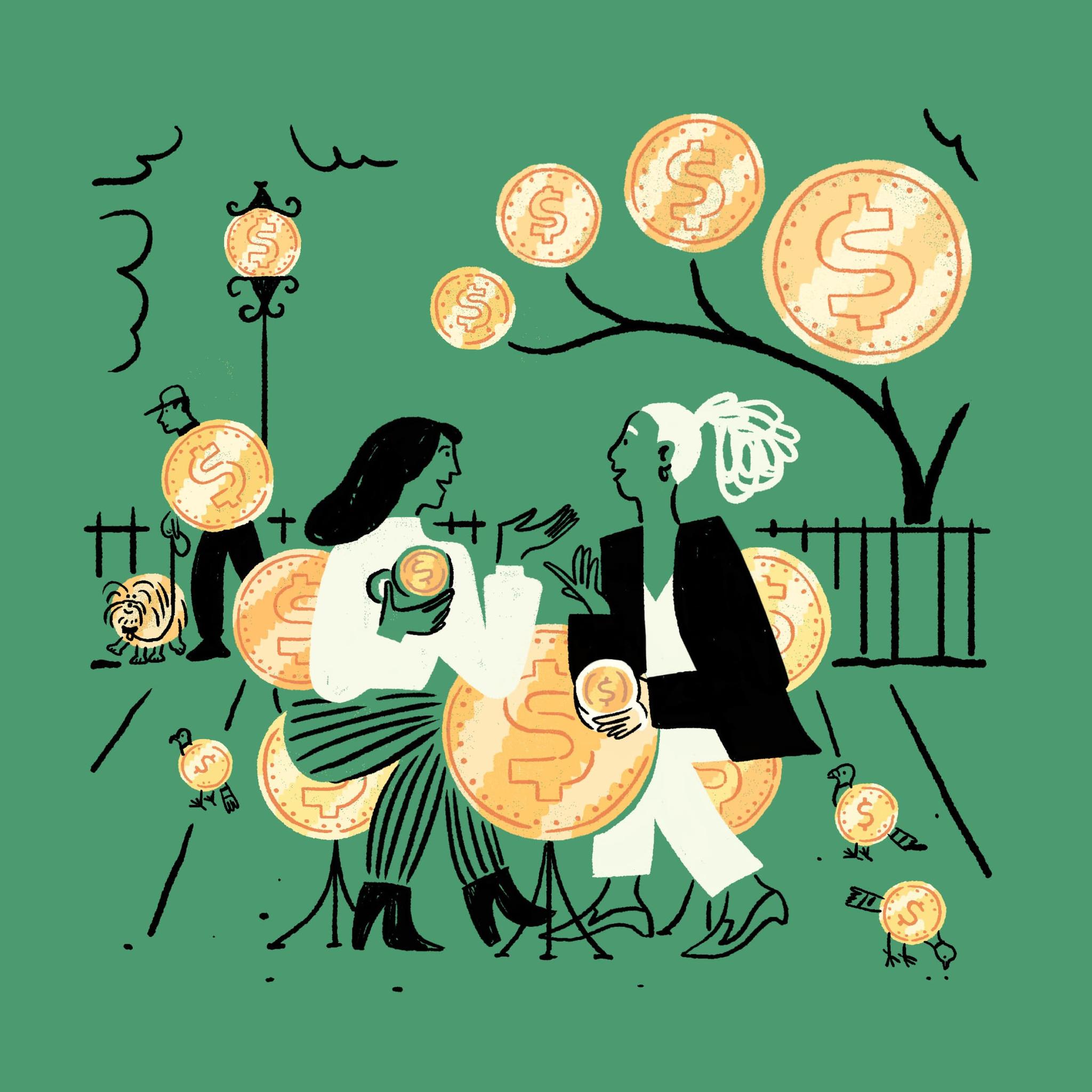
Finance for Humans
Lizzie Asks “Ask Polly”: How to be a Married Person in the World
This week Lizzie turns the tables and gets advice on marriage and money from Ask Polly’s Heather Havrilesky, the world’s funniest, most honest, most humane life-advice columnist.
Wealthsimple makes powerful financial tools to help you grow and manage your money. Learn more
Lizzie O’Leary is our advice columnist. Heather Havrilesky happens to write Lizzie’s favourite advice column. They had a conversation. Unsurprisingly, advice was given.
I’ve been reading your work for a long time. And just: thank you for being the advice giver to the advice giver. Let’s start here. Your new book is about marriage. (For those who don’t know, your old books are How to Be a Person in the World and Ask Polly’s Guide to Your Next Crisis). But talk to me a little bit about marriage and money. Is marriage a fundamentally capitalist enterprise?
We want too much from each other. My new book on marriage is ultimately about this: We fall in love and believe that our lives will be shiny forever because we’ve finally got our person. But the sad fact is that all mortals are disappointing and we smell bad a lot of the time. Ha, my book is so dark.
My big thing is stuffing humble pleasures into my day as much as I can, and one humble pleasure is just sitting with your pointless, tedious spouse and listening to them talk about their dumb things — and thinking about how cute it is that they’re so unrelentingly dull and repetitive. I mean, that’s not supply and demand in action. That kind of simple poetry of reluctant acceptance is the opposite of market forces in action.
Mmm, but the market is sexy, you have to admit. Drag your hot ass out the door and see what kind of inflated price you might garner on the open market? See, I do love money and numbers and competition, and I also love the thought of open marriages, cheating, escaping to Italy with my new lover… what should his name be? Something that starts with an F and an L. Flavio? Is that a name? Flavor Flav?
Boy, I’m bad at answering simple questions.
I wonder if you think there are any universal best practices for not letting money eat away at your relationship. Or is it all individual?
Fighting about money is terrible. But it’s a lot like sex. You can’t treat it like some magical realm that can’t be spoken of. You have to be very practical: Here’s what works for us. Here’s what doesn’t work. I’ve said the same thing to my husband a million times during our 15 years of marriage: It’s just a conversation. You want to see your friends more? You want to cook less? You want to change our schedule in some way? You want us to scrape up the money to do x or y or z even though we’re in debt? It’s a conversation. We talk until we can figure it out. In other words, it doesn’t have to be emotionally charged. We’re not robbing from each other. We both want the same thing: We want the other person to feel good and be happy and at peace.
Going in with an expansive, generous mindset in marriage is crucial. It can’t be “You’re getting more than I am.” It has to be “Are you getting enough? Do you need more? Let’s discuss it.” Again, the opposite of capitalism!
I think that I was raised to see money as a source of freedom. That making my own money, having my own money — those were almost feminist principles. Ways to insulate myself against depending on someone too much, or being less powerful in a relationship. It’s certainly a valid lesson, but thinking about it now, it seems to add this hint of competition and/or instability in a relationship. How do you think the “my money” “your money” thing shapes relationships?
I think money is important for women. When I was in my late twenties, I read this book, “Smart Women Finish Rich,” which, my god that title! What did she mean by “finish” — DIE? Because no, thank you! But it was a great book that quickly outlined how screwed you’d be if you didn’t save like crazy and guard your assets from men.
When I met my husband, I was all about rubbing my smart saving strategies in his face because he was seven years older and hadn’t saved a cent.
Is it better to just pool everything because you should be on the same page? Or is it helpful to keep a little bit to yourself if you can?
Well, I always thought joint checking accounts sounded unhinged when I was younger. It went against every cell in my body. But then I noticed that my husband was mismanaging his money completely — paying credit card fees and late fees every month, among other things. And as a type-A control freak, I couldn’t tolerate it. So I took over everything, and we pooled everything, and that’s worked well for us, honestly. He’s thrilled and grateful that I deal with it, and I enjoy it a little. Plus, he thinks I’m doing an amazing job even when I’m frankly pretty mediocre at it. He just doesn’t know better.
Managing money is sort of about tricking yourself into thinking you’re at once poorer and richer than you really are.
Hedging your bets is just logical, of course. You have to have your own retirement account. I hate hearing about women whose husbands have 401(k)s, but they have nothing. You need term life insurance if you have kids. Until you’re together for a long time, it’s smart to be a little cautious. Once you know your husband will never leave you because he can’t function on his own, then you’re probably in the clear. The codependent hedge!
I am asking in part because I was someone who was single for a long time and then got married at 42 and had a baby at 44. I was used to being a solo operator for a long time! And I think a part of me still feels sort of weird about putting most of my income into a joint bank account and running financial decisions through another person (we have a joint account, and then we each have our own accounts as well). Case in point: my husband and I just spent some time in August going through all our accounts, working on our budget, etc., and then I made a command decision about hiring a bimonthly housecleaner without consulting him. And he, rightly, was mildly annoyed. But I just sort of forgot that I don’t get to make those calls solo anymore.
How do I keep that partner muscle in better shape and not default to what I know how to do?
I don’t know about partner muscles. I think most marriages eventually result in two specialists who do what they do best and let the other person handle the shit they’re bad at. You stop caring about how your spouse does x if you hate doing x. But you have a toddler, right? That’s a very specific time in a marriage where both people feel like life is out of control. It’s hard not to want to make everything into a long committee meeting during those years. You also haven’t been married THAT long, so you have that fear of, “OH NO HE PUT THE TOILET ROLL ON THE WRONG WAY, I’LL HAVE TO TOLERATE THIS FOR THE REST OF MY LIFE!”
And yeah, by the way, you will. But there’s less fear. It’s more like: Yep. This again. I get it now. There’s no escape.
Defeat is good for you. I think they used to call it “the surrendered marriage.” Again, it’s the opposite of capitalism. It’s “I accept being chained to this weirdo forever, and therefore I accept all of the little taxing peculiarities and behavioural quirks that go along with it. Anyway, he does the dishes at night, so what do I have to complain about?”
Ah, as a side note: If you can trick your husband into doing the dishes every night, well, a lot can go wrong — and you’ll still be pretty happy with your situation.
Like I said, I’ve been reading you for years. One thing you’ve mentioned in the past is this search for a “just slightly better” version of ourselves. Is that push to be Lizzie 2.0 (this is the year I wipe out debt, learn French, etc.) external, or is it innate? Is it economical?
These days, I really try hard to avoid any implication that a person should try to be ‘better.’ But in the early days of writing my column, I’m sure that was the vibe. I was pretty broke at the time. Like so many writers who aren’t sitting on a trust fund, my emotional well-being and my ego — and a lot of other layers of my existence — were all twisted together in some very messy capitalist overachiever mindset, whereby I would find peace by becoming a better mother, a cooler person, more fit, more successful, more loved by all — and of course also less broke.
I had three kids, two dogs, a mortgage, a filthy house, countless freelance deadlines and book deadlines, and not enough time to think straight.
Something I’ve found in the years since then, though, is that the more you focus on all of the stuff you should ‘fix’ in your life in order to be less of a garbage person, the more garbagey you seem to feel. It used to be hard for me to really slow down and connect with my kids or write anything that I was excited about because I was always beating myself up about some sloppy dimension of my existence: this rug is covered in dog hair, this window is filthy, these shoes are dumb. I think for years, I experienced myself as a disappointment. I liked myself but I was constantly in this eye rolling, sighing state like, “WOW, YOU REALLY CAN’T GET IT RIGHT, CAN YOU LADY?”
You’re never totally free. Shit happens, and you roll with it and look for joy anyway.
Now granted, that’s sort of the dominant mood of being a woman with little kids and full-time work. But what I’ve found over the years is that the less I expect of myself, the happier I am. I try to avoid resolutions, and I hate “this is the year I x.” I try to think more about my day. This morning I wrote: "My job today is to smell the air.” Granted, my job yesterday was to get my goddamn column written already and to make sure it didn’t suck. You’re never totally free. But that’s all the more reason why you can’t be better and better. Shit happens, and you roll with it and look for joy anyway.
Do you have a burning money etiquette question?
ASK LIZZIE
Do you have a burning money etiquette question?
Ask our expert columnist, Lizzie O'Leary, and she may answer you in an upcoming column.

But don’t you think, given the world we live in and how society works, that even if you consciously reject any capitalist framework — it still kind of seeps into our sense of self?
Absolutely. We treat money as validation in this society. And just being a human, having a fragile physical self, having feelings you can’t control, living in a brutal world where few people seem to see you clearly or give a fuck about you — all of these things fly in the face of our capitalist expectations of living your best life, triumphantly rising to every challenge, falling in love with the ‘right’ person, becoming more and more deeply OURSELVES… it starts to sound like a kind of branding or marketing exercise, doesn’t it?
It’s never been harder to loosen those dehumanizing knots and let yourself be an inadequate, confused animal who’s just trying to feel love and survive.
Did becoming a parent change how you handled money? And are there money lessons you really hope your kids take with them into adulthood?
I got sloppier, probably, but I also got more responsible in other ways. We got life insurance, and I guess I felt guiltier spending money on myself. I mean, I basically didn’t buy clothes or get my hair handled by a professional at all for my kids’ first ten years of life. I have the frumpy photos of myself to prove it. I also insisted on saving money even when we were in debt. That sounds nonsensical, but I think it’s smart even when you’re not earning a good rate on your savings because it helps you to feel better about your debt. You’re scraping by but you’re like, “There IS a college fund!” or “I do still save for retirement even though I’m not sure what to do when this 0% credit card flips over to 18%!”
That kind of simple poetry of reluctant acceptance is the opposite of market forces in action.
Like anything else, managing money is sort of about tricking yourself into thinking you’re at once poorer and richer than you really are. You have to feel poor when you’re considering having a $15 drink at a bar. And you have to pretend that you’re rich when you’re paralyzed by the big picture of how you’ll ever afford anything. It’s really impossible to build wealth when you repeat to yourself, “I’ll never save a cent! It’s impossible!” You kind of have to believe that your paltry savings will add up one day in the distant future, just to motivate yourself to do it. I guess my strategy is that you save a little too much so that you always feel a little poor and that way, you don’t waste money constantly.
I mostly just want my kids to get into the habit of saving. For me, that always meant putting it in places where I couldn’t touch it. If I can reach it, I will spend it!
That said, my husband and I really felt like we couldn’t spend a dime on ourselves for years. And we’d kind of break down and spend too much out of the blue, just because we resented feeling so broke all the time.
Money is hard!
Lizzie O'Leary is a longtime economic and policy journalist. She hosts the podcast “What Next: TBD” at Slate.








